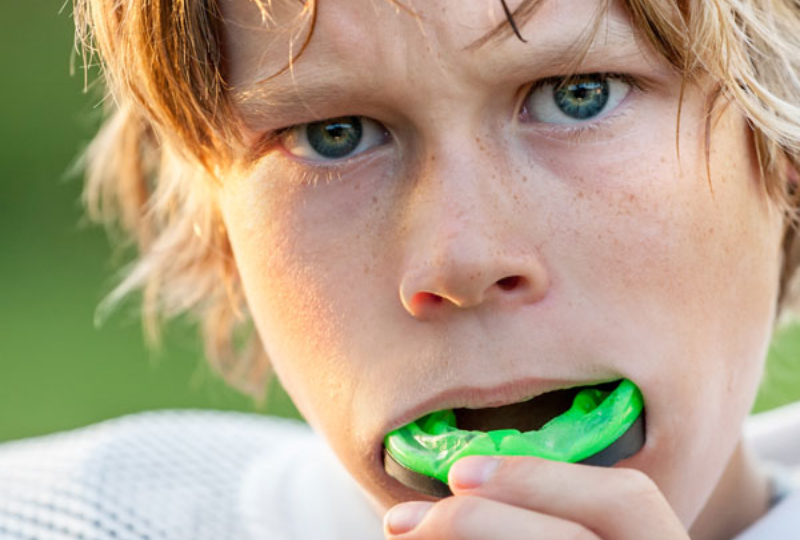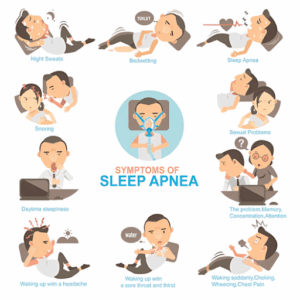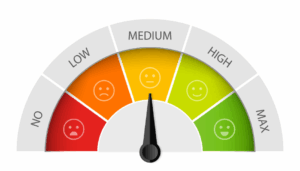
A concussion is a type of traumatic brain injury (TBI) caused by a bump, blow, or jolt to the head or body. It causes the head and brain to move rapidly back and forth. This sudden movement can lead to chemical changes in the brain and symptoms such as:
- Headaches
- Dizziness
- Cognitive impairments
- And even brain cell damage, further leading to long-term neurological issues.
Did you know that each year, an estimated 1.6 to 3.8 million sports-related concussions occur in the United States alone? These injuries are particularly prevalent among high school athletes, with football accounting for nearly half of all reported concussions.
Given these risks, athletes, parents, and coaches are increasingly seeking effective protective measures. Here is where mouthguards for sports come into play.
What are Mouthguards?
Mouthguards are protective devices worn over the teeth to reduce the risk of injury to the mouth, teeth, lips, tongue, and jaw. They are commonly used in sports such as football, hockey, rugby, boxing, etc.
These devices help absorb and distribute the force of a blow, potentially preventing broken teeth, cuts, and even concussions.
Types of Mouthguards
- Stock Mouthguards: Pre-formed and ready to wear, but often bulky and may not fit well.
- Boil-and-Bite Mouthguards: Made from thermoplastic material, these can be softened in boiling water and then shaped around the teeth using finger and tongue pressure.
- Custom-Fitted Mouthguards: Made by a dentist or professional laboratory based on an impression of the teeth, offering the best fit and protection.
Does Fit Matter?
Absolutely. All types of mouthguards provide a degree of protection, but the fit and material will significantly impact the efficiency.
In fact, a study found that individuals who wear over-the-counter mouthguards are twice as likely to suffer brain injuries as those who use custom mouthguards.
Hence, athletes in high-impact sports tend to prefer custom-fitted guards because:
- They fit tightly and are sure to stay in place.
- Its shock absorption is superior.
- High-quality materials are used to manufacture them, and they have a longer lifespan.
- They’re less likely to agitate or block breathing and speech.
Can Mouthguards Prevent Concussions?
Short answer: The evidence is mixed.
Mouthguards are primarily designed to prevent dental injuries, jaw fractures, and soft tissue damage (like tongue or cheek lacerations). There are several studies that indicate mouthguards help reduce the chances of concussion, but they should not be considered a substitute for other protective gear or concussion protocols.
According to a study, youth ice hockey players who wore mouthguards had a 28% lower concussion rate and 57% lower odds of concussion compared to non-wearers.
However, a systematic review analyzing five studies revealed a negative incident rate ratio (0.81) against the incidence of sports-related concussions, although this was not statistically significant (p = 0.18).
So, mouthguards should be part of a broader injury prevention strategy, but you can’t completely rely on them to mitigate the risk of concussions.
Should You Wear a Mouthguard?
Yes—without question. Even if they don’t fully prevent concussions, mouthguards are a critical piece of protective equipment in contact sports.
They:
- Reduce the risk of chipped or lost teeth
- Help prevent soft tissue injuries
- Support jaw alignment during impact
And while concussion prevention may not be guaranteed, any gear that lessens impact severity or improves safety is worth considering.
Final Thoughts
Now that you know how mouthguards can help reduce the risk of concussion, what are you waiting for? Take steps to ensure your safety by investing in high-quality custom mouthguards for your protection.
Make sure that the mouthguard you select is made of high-quality material and properly fitted to your teeth.






